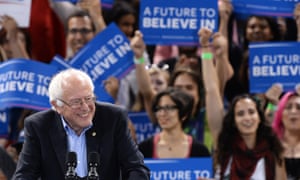Oregon’s voters divided on corporate sales tax proposal to fund services

Getting companies with annual sales over $25m to stump up for education and healthcare should be a no-brainer, right? Big business begs to differ

The most expensive political battle in Oregons history will culminate next week when Oregonians go to the polls. But the fight isnt between Hillary Clinton and Donald Trump. Instead, big business has been bombarding voters with ads in an effort to see off a bill that would force them to pay more in taxes towards funding the states education, healthcare and senior services.
Oregon has the lowest corporate taxes in the country, chiefly due to the state having no sales tax. In corporate income tax, however, Oregon rests somewhere in the middle.
The proposal, Measure 97, would make any corporation with annual sales of more than $25m in Oregon pay a minimum tax of $30,001, plus a 2.5% tax on their sales above $25m.
The contentious debate over the ballot measure has left the state divided, with millions being spent on ads, mailers and TV spots. Some of the worlds largest corporations Shell, Walmart, Comcast and Wells Fargo have paid out of pocket to defeat the corporate tax increase in Oregon. Total contributions both in and out of state exceed over $23m.
Proposed by the union-led coalition Our Oregon, the measure is aimed at stabilizing a trembling Oregon economy and avoiding a looming $1.4bn budget shortfall for the next two years. State economists project the corporate tax increase would raise some $3bn a year in revenue, increasing the states budget by roughly a third.
More than most states, the Democratic-dominated Oregon relies on personal income taxes which total 75% of the states tax collections to fund services and programs like education, public safety and prisons. Because of our high dependence on the personal income tax, we have more volatility than the typical state, said economist Paul Warner, of Oregons non-partisan Legislative Revenue Office (LRO).
In an economic upturn when Oregonians are making money the state budget benefits from increased personal income tax revenue. But when a recession hits, income tax becomes a faulty cash stream, and the state is forced to shortchange programs and services. The ballot measure is intended to make the state less reliant on personal income taxes and more on gross receipts revenue from large businesses.
But the debate has opponents and supporters shouting different answers to the same question: who bears the cost in the end?
While the measure would directly tax only a small pool of the wealthiest corporations less than a quarter of 1% of all businesses operating in the state opponents claim that Measure 97 is a deceptively disguised sales tax, which Oregonians have continually shot down since the 1930s.
A coalition of more than 26,000 supporters including consumers, family farmers, small and large businesses, and local chambers of commerce have come together to defeat it.
They argue that it will be detrimental to businesses with low margins. Meanwhile, the tax would be levied on all transactions down the line in the retail, wholesale and utility sectors. The result, they warn, would be higher prices for Oregonians on everything from electricity and healthcare to food and medicine.
Theres a consensus that there will be some upward pressure on prices. I think the issue is around how much, said Warner, who estimates that consumer prices would increase by 0.8%.
Robert Whelan, director of the economic consulting firm ECONorthwest, said the problem is that Measure 97 taxes sales, not profits. A chain like Safeway or Fred Meyer passes the $25m threshold in the first week of each year, he said. Thereafter, they have to pay 2.5% of their sales in tax, even if the stores fail to make a profit. And that happens.
Portland General Electric (PGE) has contributed $250,000 to the campaign against Measure 97. Various suppliers, vendors and contractors we work with would also be subject to the new tax, and can be expected to pass their increased costs along to us, said Steven Corson, communications director at PGE. He predicts the companys retail customer base of more than 800,000 would face a price increase of about 2%.
The Legislative Revenue Office (LRO) has projected that the measure could cost the average Oregonian household an extra $600 per year.
Higher expenses for residents and the loss of thousands of private sector jobs are huge prices for Oregonians to pay, especially when there is absolutely no guarantee for how the money would be spent, said Rebecca Tweed, the statewide campaign coordinator for the measures opposition. While the language of the measure says it is to fund education, healthcare and senior services, the legislative assembly is not bound by a promise.
The opposition says voters should not be put in charge of the states tax system. Addressing and resolving Oregons budget needs and tax policy is the responsibility of the Oregon legislature and the governor, said Tweed.
But supporters say the opposition is using scare tactics screaming job loss and price hikes to dissuade voters. They argue that competitive pressures will make it difficult for corporations to raise prices.

Research shows that the large out-of-state corporations generally have national pricing strategies, which means that they charge the same price for the same product in every state. There is no relationship between tax regimes and corporate pricing, said Martin Hart-Landsberg, proponent of Measure 97 and professor of economics at Lewis and Clark College in Portland.
Katherine Driessen, a spokeswoman for the Yes on 97 campaign, said big business wouldnt be sweating it if their customers were going to bear the cost. The only reason that corporations like Wells Fargo and Comcast are spending millions is because they know that its corporations, not consumers, that are going to pay this tax, she said.
In the 20132014 budget year, businesses in Oregon accounted for an estimated 37.6% of taxes, the fourth lowest of the 50 states and the District of Columbia, according to a study by Ernst & Young for the Council on State Taxation. If passed, Measure 97 would put Oregons business share of total state and local taxes at 45.4%, just above the national average at 45%. The measure would also bump Oregon up from 28th to 20th highest in total per capita taxes.
If Measure 97 fails to pass, supporters fear a continuation of the status quo, which they say is unacceptable.
While education receives about 40% of the states almost $20bn general fund, a large group of educators and parents say resources are stretched.
Educators are frontline witnesses to the trauma our students come from, said Suzanne Cohen, president of the Portland Association of Teachers, adding that a limited staff of nurses and social workers could not meet the demands of impoverished students.
Educators are having to choose between keeping physical education or electives like art and music, while receiving unfunded mandates from the state, such as requiring career and technical education. But without increased revenue, youre left increasing class size and cutting from other programs, said Cohen.
Oregon has the fourth-lowest high school graduation rate and the third-largest class size in the country.
According to Cohen, every aspect of education from transportation to curriculum to cafeteria standards has been stripped. Even basics such as textbooks, pencils and paper are scarce. In Portland, school buildings have been vulnerable to lead in the water, asbestos, airborne heavy metals, and earthquakes.
Cohen said Measure 97 was really about getting people to understand how much more money this could be for our schools and how much it could provide.
Property taxes had been a traditional source of education funding in the past, but in the 1990s voters began dialing them back.
Mireille Lafont, member of the board of directors of the Oregon Public Health Association, said voters should stop dividing sectors over the measure. Measure 97 is a public health issue, inclusively, she said. Education is public health, and it creates better opportunity for health.
Lafont points out that Oregon has consistently ranked in the bottom half in the country for public health spending. Measure 97 could help fill in the gaps.
Moreover, one in 10 Oregonians still lacks medical insurance, while 61% more Oregon seniors are living in poverty today compared with a decade ago.
Without Measure 97, the state would be forced to look to other revenue options and austerity. Larger sectors, like education, would probably bear the brunt.
A new poll conducted for Oregon Public Broadcasting (OPB) shows 48% of respondents oppose the measure, while 43% support it including Governor Kate Brown and 10% are undecided. The former presidential candidate Bernie Sanders announced his support for Measure 97 in October.
In the presidential election, Clinton has a 10-point lead in some polls. Itll be big business more than the Democrats biting their nails next Tuesday.
Read more: https://www.theguardian.com/us-news/2016/nov/04/oregon-corporate-income-tax-proposal-voters